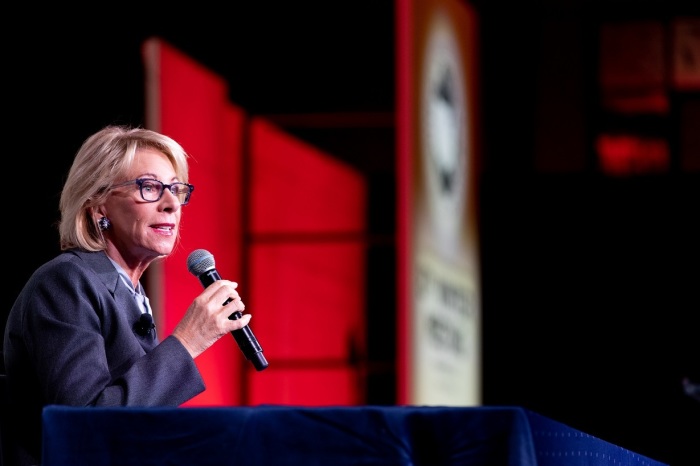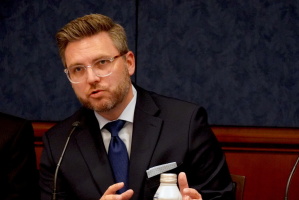Education Sec. will no longer enforce restriction on religious organizations providing ‘equitable services’

Calling the restriction unconstitutional, U.S. Secretary of Education Betsy Devos said Monday that her agency will no longer enforce a restriction that bars religious organizations from providing contract-based “equitable services” such as special education and tutoring solely due to their religious affiliation.
Speaking at the Council for American Private Education State Directors Annual Meeting, Devos saida provision in the Elementary and Secondary Education Act, which governs the nation’s elementary, middle and high schools, was also unconstitutional.
The ESEA requires that school districts offer low-income or vulnerable students who attend private schools the same services, such as special education, tutoring or mentoring, that their public-school counterparts get. The law requires that those contractors, however, be independent of “any religious organization.”
Devos concluded after consulting with her legal team that the restriction on religious organizations in providing services run counter to the 2017 U.S. Supreme Court decision in Trinity Lutheran Church of Columbia, Inc. v. Comer. In that case, it was found that the state of Missouri had unconstitutionally engaged in religious discrimination when it denied a church-run preschool publicly funded tire scraps for its playground.
“The Trinity Lutheran decision reaffirmed the long-understood intent of the First Amendment to not restrict the free exercise of religion,” DeVos said in a statement. “Those seeking to provide high-quality educational services to students and teachers should not be discriminated against simply based on the religious character of their organization.”
It was noted that the education agency would continue to enforce all other applicable provisions of federal law ensuring that school districts hire contractors that are independent of the private school for which they are providing services and that the educational services and other benefits being provided by contractors are “secular, neutral and non-ideological.”
Devos sent a letter on Monday to Speaker Nancy Pelosi, the California Democrat, and several other congressional leaders outlining her decision, The New York Times reported.
Democrats are also reviewing its legality.
“House Democrats are carefully reviewing the legality of the administration’s new policy,” Joshua Weisz, a spokesman for the House Education Committee, told the Times.
Elizabeth Hill, a spokeswoman for DeVos, told Education Week that the recent decision "is further evidence of the secretary and the administration's commitment to making sure that schools are not discriminated against based on their religious affiliation."
Jeff Simmering, director of government relations for the Council of the Great City Schools, argued that the decision is likely to be challenged.
"I'm not saying it's incorrect, but it's a jump in legal logic to go from saying it's OK to provide funds to a contractor who is going to resurface a private school playground to a contractor that's going to provide instructional services," he said. "I'm sure we will all have an opportunity to think long and hard" about the impact of that, "because I'm sure it's going to be challenged."
Church and state separation advocates such as Maggie Garrett, vice president for public policy at Americans United for Separation of Church and State, argued that the decision is cause for concern.
"Betsy DeVos is neither the Supreme Court nor Congress. She does not get to unilaterally declare that a statute is unconstitutional, especially with a provision that is designed to protect church-state separation, a bedrock of our democracy," she told Education Week. "Trinity Lutheran was an incredibly narrow decision that was about providing playground material to a church not about providing educational services to impressionable young schoolchildren."
Republican Sen. James Lankford from Oklahoma said, meanwhile, that the move was a great one for the faith community.
“Great news for the faith community. Thank you to @usedgov for protecting religious liberty,” he tweeted Tuesday morning.
Galen Carey, vice president of government relations for the National Association of Evangelicals, agreed.
“Organizations shouldn't be disqualified from serving on an equal basis just because of their religious views. Grateful the federal government is (finally) recognizing this. Thanks to @SenatorLankford for his support,” Carey tweeted.





























